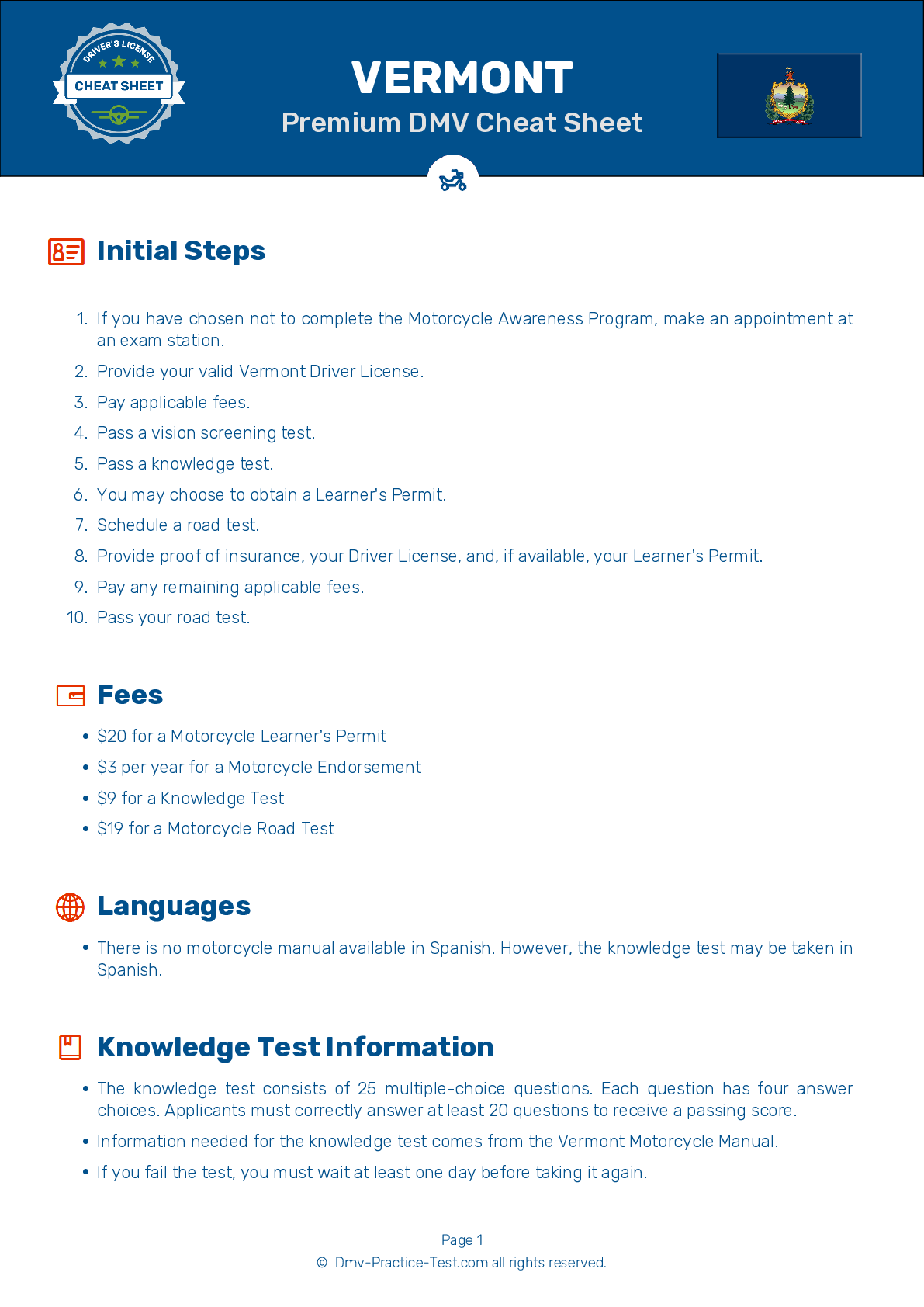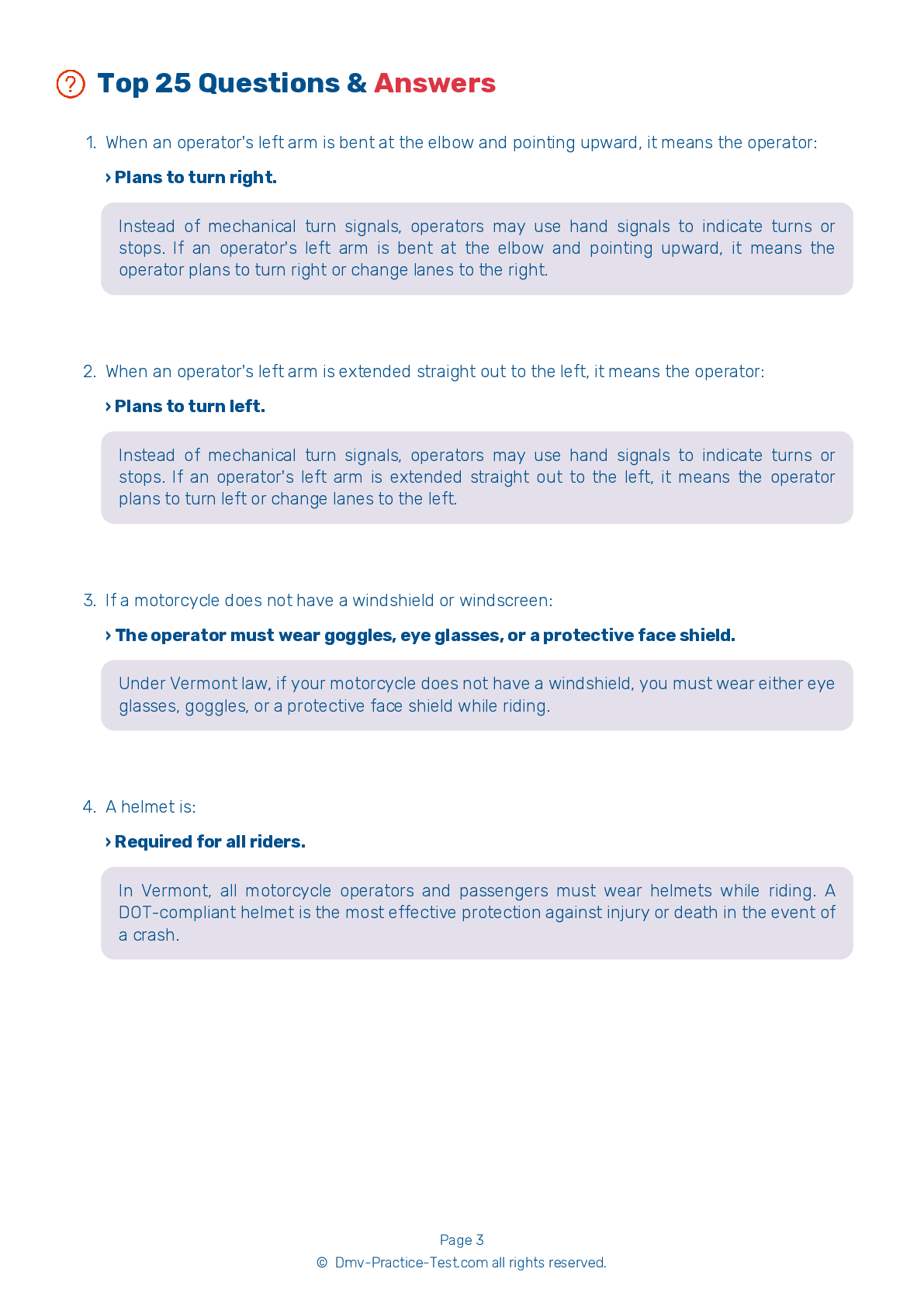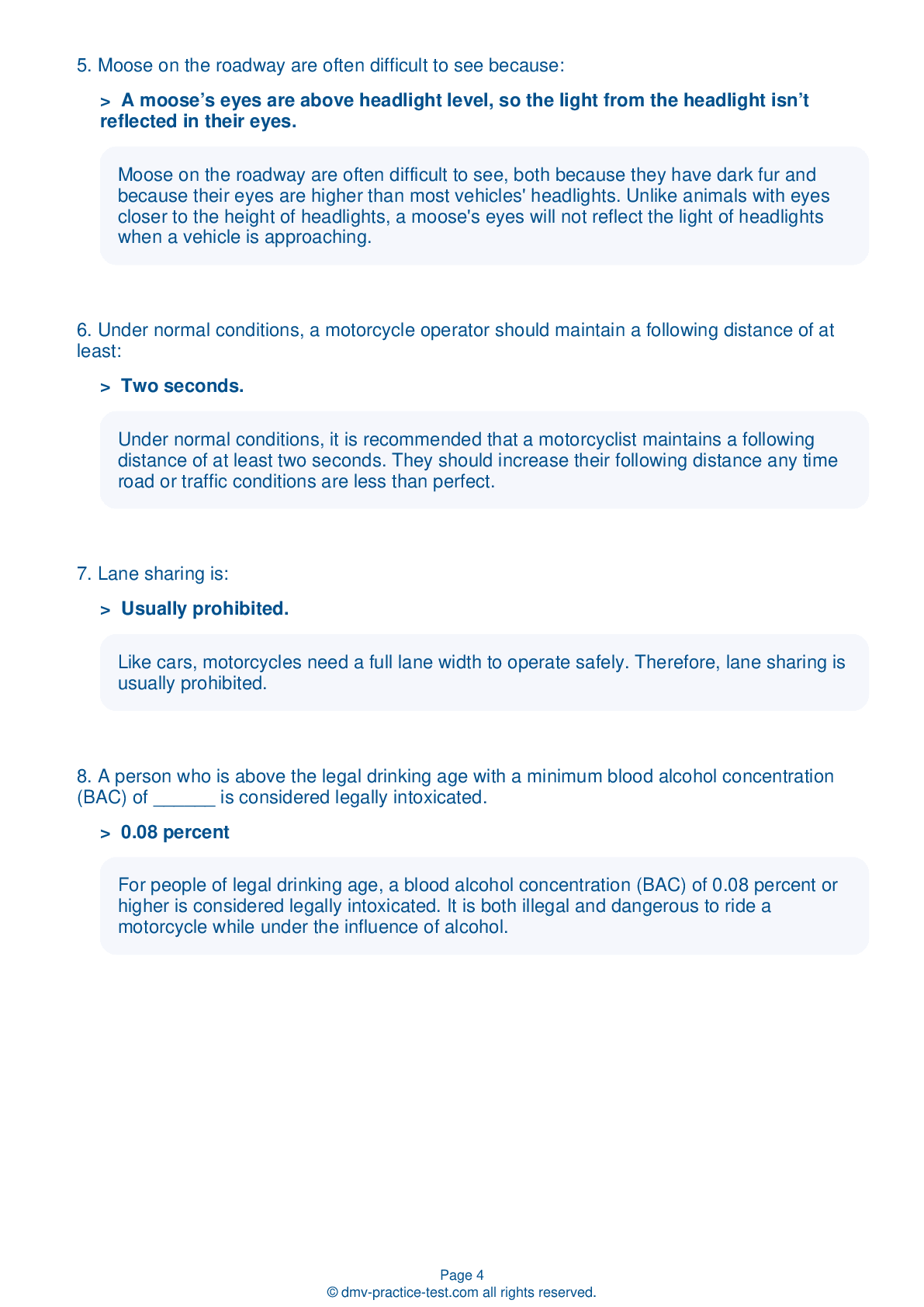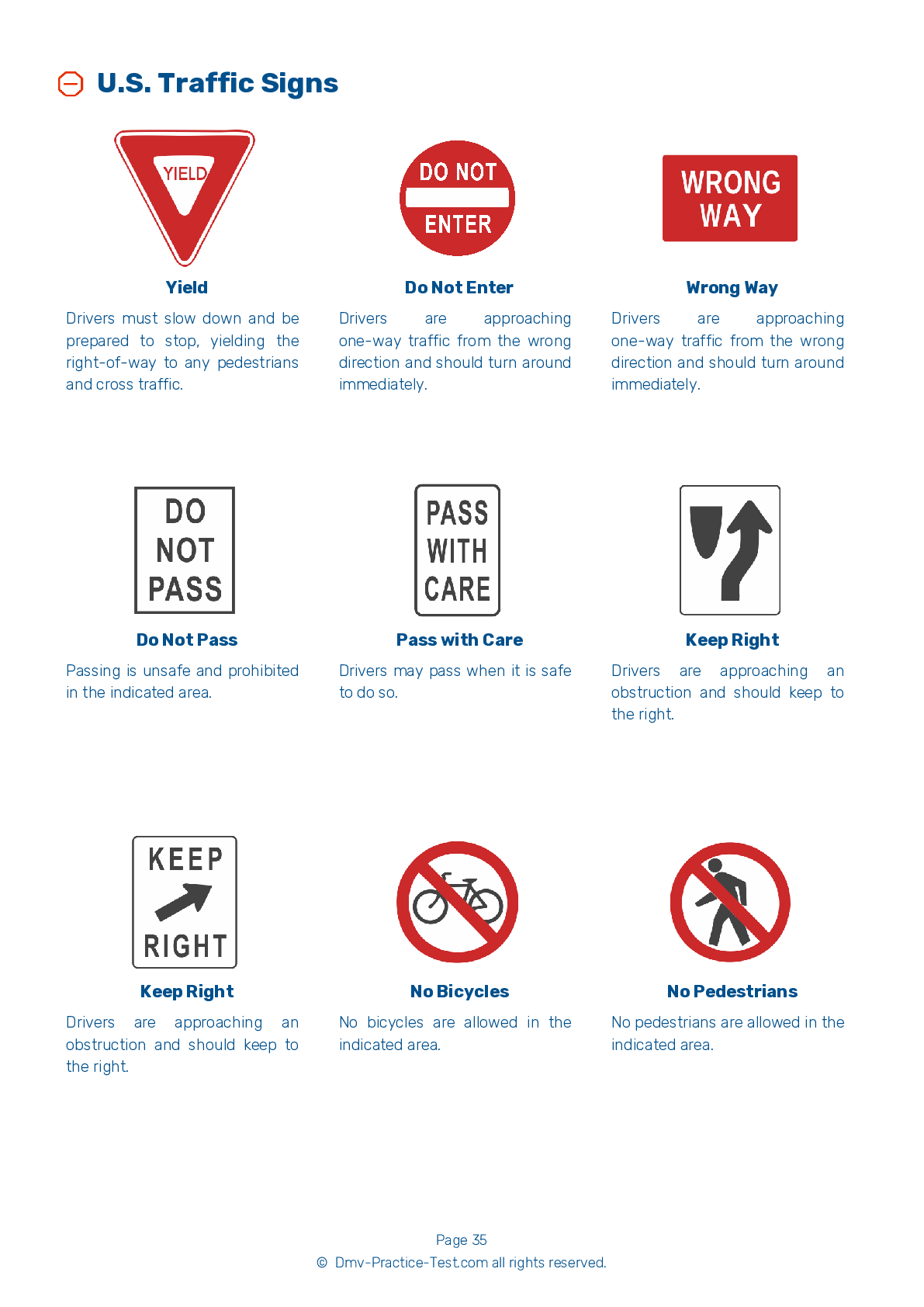DMV Permit Test #1
Motorcycle Test | License VT 2026 | FREE Online Practice! #1
Take this FREE motorcycle test (license in VT 2026) to check your knowledge of the road rules. To improve your results, download a motorcycle handbook online, study theory, and practice for free on our website. Still worried about how to get a motorcycle license in Vermont in 2026? Check our website for more sample tests, train as much as possible, and boost your grades!
25
20
16
1 . If attempting to brake in a curve, you should:
Only use the rear brake.
Because tires have less traction when a motorcycle is leaning than when it is upright, always try to position your motorcycle in an upright position before braking. If you must brake while in a curve, apply the brakes more smoothly and gradually than if your motorcycle was traveling on a straightaway.
2 . To help other drivers see you, you should wear:
A black jacket.
Wearing brightly-colored clothing will help you to be seen by other road users. Wear clothes that increase your visibility both during the day and at night.
3 . Crashes are more likely to occur among:
Those who have completed a safety course.
Crashes are the most likely to occur for untrained, beginning riders who are unfamiliar with their motorcycle.
4 . Your knees should be:
Wherever you prefer.
Keep your knees against the gas tank to help with your balance as you turn the motorcycle.
5 . When going through a turn on a motorcycle, you should:
Increase your speed before the turn.
When making a turn, you should look through the turn to where you want to go. Turn just your head, not your shoulders, and keep your eyes level with the horizon.
6 . A leather jacket:
Should not be worn when riding.
For your protection, you should wear a long-sleeved jacket, ideally made of leather, when riding. In warm weather, a leather jacket can help protect you against dehydration. Many motorcycle jackets are designed to help keep you cool even when the weather is hot.
2026 Vermont | Frequently Asked Questions
In Vermont, to acquire a motorcycle driver's license, you must first obtain a motorcycle learner's permit. This requires passing a written test. After practicing with the permit for at least one month, you can then take the motorcycle skills test. Successfully passing this test will grant you a full motorcycle endorsement on your driver's license.
In Vermont, the minimum age to obtain a motorcycle learner's permit is 16. Once you have the permit, you can apply for a motorcycle endorsement. However, if you're under 18, you'll need parental or guardian consent and must complete a motorcycle rider training course before obtaining the endorsement.
Yes, in Vermont, you need a dedicated motorcycle endorsement on your existing driver's license to legally ride a motorcycle. You can obtain this by passing a written test, a vision screening, and a skills test. Alternatively, completion of an approved Vermont Rider Education Program (VREP) can also qualify you for the endorsement.
To apply for a motorcycle driver's license in Vermont, you'll need a completed application form, proof of identity (like a birth certificate or passport), proof of Social Security number, proof of Vermont residency, and the appropriate fee. If you're under 18, you'll also need a parental consent form. If you've completed a VREP course, bring your completion card.
Yes, to obtain a motorcycle license in Vermont, you will need to pass a written exam. The test covers topics such as motorcycle operation and handling, traffic laws, road signs, and safe riding techniques. However, if you complete an approved Vermont Rider Education Program (VREP) course, you may be able to waive this requirement.
The motorcycle written test in Vermont covers a range of topics related to motorcycle operation and safety. These include traffic laws, road signs, safe riding techniques, handling emergencies, and protective gear. The test is based on the information found in the Vermont Motorcycle Operator Manual. It's designed to ensure that you understand the rules of the road and can operate a motorcycle safely.
Yes, in Vermont, successful completion of a Vermont Rider Education Program (VREP) approved motorcycle training course can substitute for the written and skills tests required by the DMV. This means if you pass the course, you can get your motorcycle endorsement without taking the DMV's written or skills tests.
In Vermont, you can enroll in a motorcycle training course through the Vermont Rider Education Program (VREP). You can register online or by phone. The course includes both classroom and hands-on instruction. Upon successful completion, you may be eligible to waive the DMV written and skills tests for your motorcycle endorsement.
In Vermont, you do not necessarily need to own a motorcycle for the license test. You can use any motorcycle provided it is street-legal, has valid registration and insurance, and is appropriate for your skill level. However, you need to have a legal way to transport the motorcycle to the test site.
Yes, you can use a friend's motorcycle for the driver's license evaluation in Vermont. However, the motorcycle must be legally registered, insured, and pass a safety inspection. You must also have a signed permission from the owner if the motorcycle is not registered in your name. Remember to bring your own helmet for the test.
Yes, during the Vermont motorcycle driving exam, specific handling skills are tested. These include ability to control the motorcycle at low and high speeds, turning, swerving, braking accurately and smoothly, and proper use of signals. The test also evaluates your ability to make critical decisions while riding on the road. It's crucial to practice these skills before the exam.
Yes, in Vermont, new motorcycle drivers are issued a learner's permit before getting a full license. With a permit, you cannot carry passengers, ride at night, or ride on interstate highways. After successfully passing the motorcycle skills test, these restrictions will be lifted. Always check for additional state-specific rules if traveling out of state.
Yes, your Vermont motorcycle license or endorsement is valid throughout the United States. It allows you to operate a motorcycle in any other state, following the specific traffic laws of each state. However, if you become a resident of another state, you'll need to apply for a new license in that state.
Yes, in Vermont, all motorcycle operators and passengers are required by law to wear helmets. The helmet must meet the standards set by the U.S. Department of Transportation. This law is in place to protect riders from serious injury in the event of an accident.
Yes, Vermont offers two types of motorcycle licenses: a motorcycle endorsement (added to an existing Vermont driver's license) and a motorcycle-only license. The type you choose depends on whether you already have a driver's license and your specific needs. Contact the Vermont DMV for more information about requirements and the application process.
Yes, in Vermont, you can add supplementary endorsements to your motorcycle license. These may include endorsements for commercial vehicles, school buses, or hazardous materials. To obtain these endorsements, you'll need to pass additional written and skills tests, and in some cases, complete specific training courses. Always check with the Vermont DMV for the most accurate information.
Yes, the Vermont Department of Motor Vehicles (DMV) provides the motorcycle license test in several languages other than English. It's recommended to contact your local DMV office ahead of time to ensure they offer the test in your preferred language and to schedule your exam.
To effectively prepare for the motorcycle license test in Vermont, start by reading the Vermont Motorcycle Manual thoroughly. This manual covers all the information that will be on the test. Practice tests are also very useful, they help you understand the format of the real test. Lastly, ensure you understand all road signs and rules for safe driving.
Yes, the Vermont Department of Motor Vehicles (DMV) offers the motorcycle written exam in multiple languages other than English to accommodate non-English speakers. However, it's important to contact your local DMV office in advance to ensure your preferred language is available and to schedule your test.
If you don't pass the motorcycle written test in Vermont, you are allowed to retake it. However, there is a waiting period before you can retest. The Vermont DMV requires a minimum of one day between exams. If you fail three times, you must wait a month before retaking the test. Additional fees apply for each retest.



